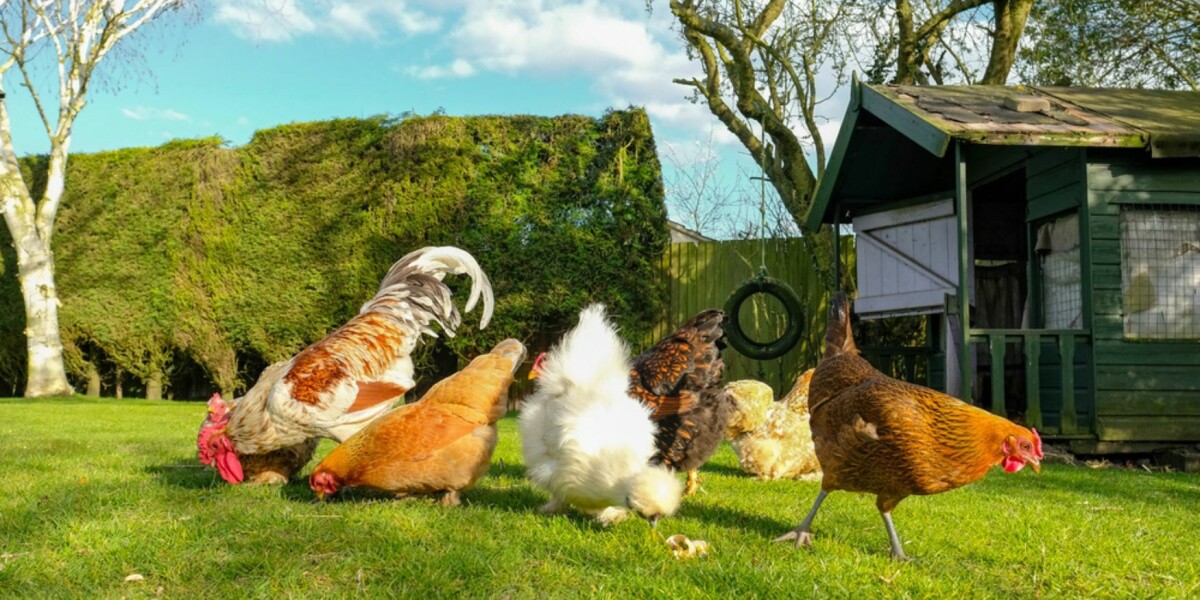How to keep hens as part of a self-sufficient life in france
How to keep hens as part of a self-sufficient life in france"
- Select a language for the TTS:
- UK English Female
- UK English Male
- US English Female
- US English Male
- Australian Female
- Australian Male
- Language selected: (auto detect) - EN
Play all audios:
TIPS ON CHOOSING THE RIGHT BREED, FOOD AND SHELTER FROM PART-TIME PAYSANNE SUE ADAMS If your French adventure includes any form of self-sufficiency, keeping chickens will play an important
part. Hens are easily acquired from neighbours, garden centres and newspaper adverts in France, though most people buy them at the local market, where they are sold individually or en masse.
WHY CHICKENS ARE A GOOD ADDITION TO YOUR GARDEN Chickens love to eat leftovers and cull garden pests. Their droppings are rich in nitrogen and other nutrients, which will speed up the
decomposition of garden compost. And, of course, you get fresh eggs. If you raise the right breed, you can eat your own free-range chickens too, though you might want to ask a neighbouring
farmer to kill and pluck them for you. READ MORE: FRENCH EGG SHORTAGES PUT SPOTLIGHT ON KEEPING HENS AT HOME A GOOD BREED FOR LAYING EGGS If your immediate objective is free eggs, make sure
that you buy a_ poule pondeuse_, or a hen which is already producing. Choose a reliable, locally popular variety. One of the most common breeds is the Transylvanian naked neck, commonly
referred to as the _cou nu_. This brown hen, easily identified by its long, feather-free neck, is an excellent layer, grows rapidly and provides good meat. It can also withstand high
temperatures – summer heatwaves will not put it off laying. Do not confuse it with the _cou nu de Forez_, a white naked neck, which is less common and was bred in the Forez region of the
Massif Central just after World War Two. Hens do not need a cockerel, unless you would like to raise chicks, but they do need company – so get more than one. READ MORE: WHAT RULES ARE THERE
FOR KEEPING HENS IN OUR GARDEN IN FRANCE? WHAT TO FEED YOUR CHICKENS Check with your mairie if there are any local restrictions on keeping hens – unlikely if you live in the countryside and
they are for your own use. You must provide them with adequate, secure housing and should feed them balanced hen food along with any scraps or surplus leafy vegetables. Sacks of hen food can
be bought at your local agricultural or garden supplier. These are often described as a _mélange basse-cour_ and are appropriate for all farmyard fowl. They contain mixed grains and some
crushed shells (to help with eggshell formation and digestion), although it is not unusual to also see oyster shells tossed into a hen run as a nutritional supplement. SHELTER AND SAFETY
FROM PREDATORS We keep our hens in an old pigsty (_porcherie_), but you can buy wooden hen houses online or at your local DIY/garden centre. Any dry building will do, as long as you can
secure it at night when foxes and _fouines_ (stone marten) do most of their hunting. Both will take a hen or two. _Fouines_ and _couleuvres_ (a large non-venomous snake) will also eat their
eggs. AN ECCENTRIC AND ORNAMENTAL BREED If you prefer a more ornamental hen, which still lays plenty of eggs, specialist chicken breeders are increasing in number. You can also buy hens at
poultry shows and agricultural fairs, including rare breeds. Among the first hens we bought was a trio of black _La Flèche_ chickens, which have a comb resembling the devil’s horns. The
breed dates from the 1600s. Ours were so eccentric that they refused to sleep in their hen house and spent every night roosting in a tree, coming down each morning to lay white eggs all over
the garden. Whatever the colour or size of your hens’ eggs, they are all edible. They should keep for up to a month, although quality declines as the eggs age. RELATED ARTICLES EGGS FROM
CHICKENS IN PRIVATE GREATER PARIS GARDENS NOT TO BE EATEN LA CHAIR DE POULE AND MORE FRENCH HEN EXPRESSIONS NEARLY 10,000 HENS RESCUED BY CHARITY CHAMPS LIBRES AUX POULES
Trending News
Page not found – Oregon ArtsWatchSorry, we couldn't find that page. The page you're looking for isn't here, or never existed in the first place. You can ...
Page not found – Oregon ArtsWatchSorry, we couldn't find that page. The page you're looking for isn't here, or never existed in the first place. You can ...
Page not found – Oregon ArtsWatchSorry, we couldn't find that page. The page you're looking for isn't here, or never existed in the first place. You can ...
Oops! That page can’t be found.Oops! That page can’t be found.It looks like nothing was found at this location. Maybe try a search?Search for:Search...
Oops! That page can’t be found.Oops! That page can’t be found.It looks like nothing was found at this location. Maybe try a search?Search for:Search...
Latests News
How to keep hens as part of a self-sufficient life in franceTIPS ON CHOOSING THE RIGHT BREED, FOOD AND SHELTER FROM PART-TIME PAYSANNE SUE ADAMS If your French adventure includes a...
Stem cells: creating a cure-allStem-cell transplantation can cure sickle-cell disease, but so far this has been limited to a lucky few. That is changin...
Please expand on this statement. Both of the 3% values appear to be costs, so why is it not 6%?Please expand on this statement. Both of the 3% values appear to be costs, so why is it not 6%?...
Alzheimer's drug sneaks through blood–brain barrierA double-sided antibody targets enzyme to reduce levels of harmful amyloid-β protein in monkeys. Access through your ins...
Structure of influenza a polymerase bound to the viral rna promoterABSTRACT The influenza virus polymerase transcribes or replicates the segmented RNA genome (viral RNA) into viral messen...
